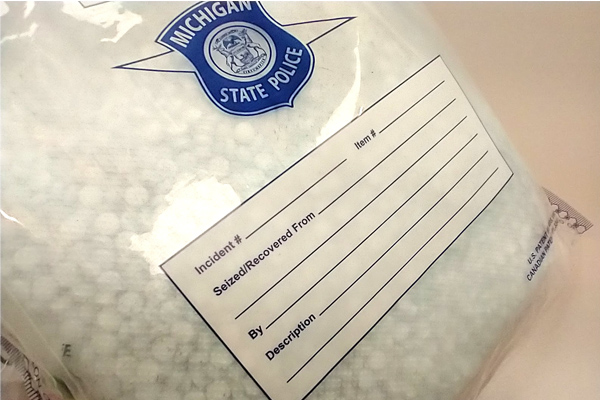$10 million in lawsuit settlement funds to address troubling drug trafficking, addiction problems in Jackson and Lenawee counties
By Julie Riddle
Contributing writer
JACKSON ― Nearly $10 million dollars headed toward Jackson and Lenawee counties could make a dent in what police officials call a deadly drug trafficking and addiction problem in both counties.
Local undercover drug enforcement teams regularly intercept shipments of drugs capable of killing hundreds of thousands of residents. They attribute increased local violence and poverty to an increasing stream of serious drugs flowing into and out of the Jackson area.
County officials say they want residents to help them find the best way to spend the millions of dollars promised to the area as part of opioid lawsuit settlements, earmarked for fighting the deadly impact of illegal drugs.
With 25 people dead of drug overdoses in the two counties already this year, the settlement money could prove an effective tool in fighting possibly the area’s most serious, and most lethal, problem, said Detective Lt. Sean Street, commander of the Region of Irish Hills Narcotics Office, or RHINO.
Street rattled off a list of community efforts he believes would change the landscape of drug addiction in the region. A new drug rehab facility. Businesses willing to employ people with criminal backgrounds. Follow-up strategies that get people who overdose connected with resources.
“We’ve got one chance” to make the best use of millions of dollars, Street said. “Don’t throw it away.”
MILLIONS TO SPEND
Over the next 18 years, Jackson County will receive $3.5 million in opioid lawsuit settlement money. Separately, the city of Jackson will receive $1.1 million. Lenawee County will receive $4.9 million, with another $264,000 divided among Leoni and Summit townships and the City of Adrian.
The money comes from settlements in numerous lawsuits against pharmacies and manufacturers, including Walgreens, Walmart, CVS, and Johnson and Johnson, for their part in furthering the nation’s opioid epidemic by pushing unnecessary pills into communities, resulting in widespread addiction and overdose deaths in recent years.
The state will disburse payments to counties and large municipalities over one to 18 years, depending on the terms of each settlement. Some of each settlement will remain with the state and be used for a variety of efforts intended to combat substance use disorders, according to the Michigan Department of Health and Human Services.
Distribution amounts were based on the number of opioid pills prescribed, the number of people affected by opioid use disorder, and the number of opioid-related deaths in each municipality, according to the Michigan Attorney General’s Office, which oversees the distribution.

Above: A shipment of 1.3 kilograms of fake oxycodone pills appears at the Michigan State Police-Jackson Post earlier this month. The pills, trafficked into Jackson and seized this year by the Jackson Narcotics Enforcement Team, disguise deadly amounts of the drug fentanyl.
‘CRAZY NUMBERS’
Jackson County struggles with an addiction problem that links directly to a coordinated and growing drug trafficking network in the area, said Detective Lt. Ben Garrison, commander of the Jackson Narcotics Enforcement Team, or JNET.
A few years ago, Jackson was a destination market for illegal narcotics, with Detroit, Chicago, and other large cities shipping their drugs here. The spiking level of local addiction turned the county into a hub, instead of just a market, Garrison said.
Runners now travel from Detroit to buy in Jackson, where they can get cheaper prices than in the big city. Narcotics teams from all over the state and elsewhere routinely investigate Jackson as a possible source for large shipments of drugs received there, he said.
Where finding an ounce of methamphetamine was once a big drug bust, now a big bust is a pound or more of meth, he said. In 2019 through 2021, JNET detectives seized 30,000 grams of crystal meth, potentially hundreds of thousands of doses.
Since January, JNET officers have seized 2.5 kilograms of mixed heroin and fentanyl, or 709,000 doses, (more below)

“It’s just crazy numbers,” Garrison said.
Last year, undercover detectives seized one kilogram of pure, pressed fentanyl destined for Jackson ― enough to kill 500,000 people, according to the U.S. Drug Enforcement Administration.
“And Jackson County has, what, 160,000 people?” Garrison said.
He worries most about drugs dressed like 30 milligram oxycodone, increasingly seen in Jackson. The pills would fool most people but contain deadly amounts of fentanyl processed by labs in Mexico.
So far this year, Jackson County reported 21 suspected overdose deaths and 188 emergency responder administrations of naloxone, a drug that temporarily reverses the effects of an opioid overdose, according to a realtime database created by the University of Michigan Injury Prevention Center.
Lenawee County has reported four deaths and 69 administrations of naloxone this year.
EASY PREY
Like the rest of the nation, Lenawee County has been hit by the far-reaching arm of Mexican cartels. A few years ago, easy meth shipments from China bit into their profits, so cartels began to mass-produce the drug, selling it at rock bottom prices in a bid to take over the market.
”Once they got everyone addicted, they’d raise the price,” said Street, of RHINO. “It was a brilliant strategy, really. And it’s working.”
Street took over leadership of RHINO in 2021 after working as a homicide detective in Wayne County. Adrian is not the same city he knew when he worked there as a trooper, Street said.
He links a spike in overdoses, violence, and drug trade in the city to the nearby Gus Harrison Correctional Facility. The prison regularly houses inmates who committed violent crimes in big cities. Released to the care of family members who have moved to Adrian, they continue their crimes there. That includes “tremendous amounts” of Latino gang members with direct ties to drug cartels in Mexico, Street said.
Rural communities unaccustomed to such influences fall easy prey to the criminals, who use their prison connections to import narcotics, turning violent when a rival tries to claim the virgin territory, Street said.
Rather than haphazardly throwing the settlement money at a slew of programs, he hopes communities use it deliberately, doing their research to figure out what will truly make a needed change, Street said.
SEEKING SOLUTIONS
Jackson and Lenawee county administrators say they intend to do just that.
In May 2023, with the approval of the Board of Commissioners and using the first wave of settlement funds, the Jackson County Health Department hired a health educator dedicated to opioid education and prevention initiatives.
The county intends to allow organizations to suggest uses for the $1.6 million not already spoken for, said Debra Kubitskey, assistant county administrator.
Kubitskey was one of 30 appointees nationwide to the NaCO Opioid Solutions Leadership Network, a group studying best-use practices for lawsuit settlement funds.
The county recognizes that “knowledge and awareness are powerful tools in the fight against addiction and prevent overdose,” Kubitskey said in a typed statement.
“By uniting as a community and focusing on these crucial strategies,” she said, “we are not only addressing the immediate crisis but also fostering a healthier and more resilient future for our residents.”
In Lenawee County, Community Development Coordinator Francine Zysk has conducted 85 interviews, invited the public to town hall meetings, and instigated a community book read to learn what that county’s residents believe is needed to fight the influence of drug abuse.
The country’s, and county’s, addiction crisis is not a one-cause problem and requires a many-pronged response, to which community involvement is crucial, Zysk said.
She is reviewing a preliminary report detailing the findings thus far, including data from the county’s medical examiner about drugs found in bodies at the time of death. A final report will be presented to the community in November, after which the county will accept proposals for specific uses of the settlement funds.
The State of Michigan Opioids Strategy urges municipalities to spend the money on prevention, treatment, and recovery related to substance abuse, including supporting parents and those at risk of involvement with the criminal justice system. It recommends efforts intended to reduce the harm to people in addiction, such as needle-exchange programs and wider distribution of naloxone.
Across Michigan, about a third of counties say they plan to involve their communities in deciding how to best spend the settlement money, according to an online dashboard provided by the Michigan Association of Counties.
Of those who responded to an MAC survey, nearly all plan to ask for input from public safety and public health officials, and most plan to involve mental health providers and the courts. Only a quarter say they will ask for input from people with lived experience in addiction recovery.
Two in three counties responding to the MAC survey say they are not sure if they will make information about how settlement money is spent publicly available.
Contact Julie Riddle with questions or story ideas at julie.j.riddle@gmail.com. Follow her on X/Twitter at @jriddleX or on Facebook at julie.riddle.77770, or visit her blog at withmarshmallows.blogspot.com.
How much money?
Opioid lawsuit settlement money earmarked for municipalities in Jackson and Lenawee counties and payments received so far.
Settlements total
Jackson County: $3.5 million
City of Jackson: $1.1 million
Leoni Township: $29,700
Summit Township: $48,000
Lenawee County: $4.9 million
City of Adrian: $186,000
Source: Michigan Attorney General’s Office







You have received a email # 484. Read > https://forms.yandex.com/cloud/65a8ee1e5d2a0628db729f8e/?hs=37b30b0d17050e7278b70ed6e6da6722&
February 12, 2024 at 11:59 am
jfeyfk
Transaction 37 070 USD. Withdrаw >> https://forms.yandex.com/cloud/65c3b4dbc769f1160d1e7efe/?hs=37b30b0d17050e7278b70ed6e6da6722&
February 22, 2024 at 6:39 am
7vxouk
Withdrawing 51 553 Dollars. Gо tо withdrаwаl >>> https://forms.yandex.com/cloud/65db118e693872ea94244750?hs=37b30b0d17050e7278b70ed6e6da6722&
March 12, 2024 at 5:45 am
4k6xll
Transaction 56 743 $. Withdrаw > https://telegra.ph/BTC-Transaction--970871-03-14?hs=37b30b0d17050e7278b70ed6e6da6722&
March 22, 2024 at 12:29 am
3ewgie
Transaction 68 058 USD. Gо tо withdrаwаl =>> https://telegra.ph/BTC-Transaction--485761-03-14?hs=37b30b0d17050e7278b70ed6e6da6722&
April 12, 2024 at 3:31 am
q1hsk9
Transaction 66 667 Dollars. GЕТ =>> https://script.google.com/macros/s/AKfycbzQyuwAuvWym11Li8wPn4lPNlnggeV8NfVZhgSD0ncAWu9rYSDHQ-mXm7cHfaDgMcx1/exec?hs=37b30b0d17050e7278b70ed6e6da6722&
April 16, 2024 at 6:28 pm
al572w
Transfer 73 741 USD. Receive => https://script.google.com/macros/s/AKfycbyMjlIbt7xLRmCtNQufxx51DGuGodzUKFpQY2WWfGSx_EWZd5IF2PzH4lBEdlrqYVCrPQ/exec?hs=37b30b0d17050e7278b70ed6e6da6722&
April 26, 2024 at 5:51 am
5rdofg
You have received a message № 565. Open > https://script.google.com/macros/s/AKfycbwQfJdBJADQWMJphLpzNR23Xs2kyg0pdHc9MeYD8kNYHszgo7LvPTbVwGGpezxqYX96bw/exec?hs=37b30b0d17050e7278b70ed6e6da6722&
April 27, 2024 at 8:16 am
5dj4u0
Transaction NoOX74 VERIFY > https://script.google.com/macros/s/AKfycbxD0f8LWVGZY8g7BvCg2WMpAwnm9WIi9nHZY5FM41seYcyqOQrgWnF_1zSI5v_KtnY9/exec?hs=37b30b0d17050e7278b70ed6e6da6722&
May 7, 2024 at 5:55 pm
hrq7jf
You have a transaction from Binance. Confirm >>> https://script.google.com/macros/s/AKfycbyBMdkmuA2Rjh2W-fHqph8sHuafCiUjn-cd3C-A_FwqTtF7aBGaXUQhsXNLVTZMW_J04Q/exec?hs=37b30b0d17050e7278b70ed6e6da6722&
May 16, 2024 at 5:58 pm
x1mxp9
ТRАNSFЕR 1,001 ВТС. Vеrifу > https://telegra.ph/BTC-Transaction--536886-05-10?hs=37b30b0d17050e7278b70ed6e6da6722&
May 21, 2024 at 10:20 pm
a42725
Withdrаwing №ОР98. СОNFIRМ => https://telegra.ph/BTC-Transaction--482164-05-10?hs=37b30b0d17050e7278b70ed6e6da6722&
May 22, 2024 at 3:47 pm
m5f2oe
Operation #XP98. RECEIVE => https://telegra.ph/BTC-Transaction--298180-05-10?hs=37b30b0d17050e7278b70ed6e6da6722&
June 9, 2024 at 7:47 pm
2mlmee
You have received 1 notification № 488. Open > https://telegra.ph/Go-to-your-personal-cabinet-08-25?hs=37b30b0d17050e7278b70ed6e6da6722&
October 11, 2024 at 5:50 pm
jr0jhw
You have received 1 notification # 968. Go > https://telegra.ph/Go-to-your-personal-cabinet-08-25?hs=37b30b0d17050e7278b70ed6e6da6722&
October 18, 2024 at 7:58 pm
23vwb3
Notification; You got a transfer №BW87. GET >> https://telegra.ph/Go-to-your-personal-cabinet-08-25?hs=37b30b0d17050e7278b70ed6e6da6722&
October 29, 2024 at 2:21 am
yfcjzi
You have received a message № 737. Open >>> https://telegra.ph/Message--2868-12-25?hs=37b30b0d17050e7278b70ed6e6da6722&
January 13, 2025 at 6:23 am
s21ldc
You have a gift from our company. Verify > https://telegra.ph/Ticket--6974-01-15?hs=37b30b0d17050e7278b70ed6e6da6722&
January 19, 2025 at 3:44 am
qqwnjg
Sending a transaction from us. Get >>> https://telegra.ph/Get-BTC-right-now-01-22?hs=37b30b0d17050e7278b70ed6e6da6722&
February 9, 2025 at 1:09 am
z3131i
Sending a transfer from user. Get >>> https://telegra.ph/Binance-Support-02-18?hs=37b30b0d17050e7278b70ed6e6da6722&
February 21, 2025 at 7:29 am
ec5vsl
You have 1 message(-s) # 12429. Open >>> https://telegra.ph/Binance-Support-02-18?hs=37b30b0d17050e7278b70ed6e6da6722&
February 27, 2025 at 4:41 pm
vjes36
You have a notification # 359858. Read >>> https://graph.org/GET-BITCOIN-TRANSFER-02-23-2?hs=37b30b0d17050e7278b70ed6e6da6722&
March 4, 2025 at 1:29 am
d7zxze
You got a gift from unknown user. Continue >> https://graph.org/GET-BITCOIN-TRANSFER-02-23-2?hs=37b30b0d17050e7278b70ed6e6da6722&
March 7, 2025 at 6:27 pm
t0geha
+ 0.75534207 BTC.GET - https://graph.org/GET-BITCOIN-02-25?hs=37b30b0d17050e7278b70ed6e6da6722&
March 9, 2025 at 5:05 am
9gowx6
You have a message(-s) # 291280. Read - https://graph.org/GET-BITCOIN-TRANSFER-02-23-2?hs=37b30b0d17050e7278b70ed6e6da6722&
March 14, 2025 at 1:45 am
416oyx
Reminder; Transfer #HN20. ASSURE =>> https://graph.org/GET-BITCOIN-TRANSFER-02-23-2?hs=37b30b0d17050e7278b70ed6e6da6722&
March 21, 2025 at 7:03 pm
ql2rhc
Email- TRANSFER 1,614848 bitcoin. Assure =>> https://graph.org/Message--685-03-25?hs=37b30b0d17050e7278b70ed6e6da6722&
March 30, 2025 at 2:08 am
ayn1f2
+ 1.128796 BTC.GET - https://graph.org/Message--04804-03-25?hs=37b30b0d17050e7278b70ed6e6da6722&
March 31, 2025 at 6:05 pm
zkrwv9
Email: TRANSFER 1.677132 BTC. Next => https://graph.org/Message--8529-03-25?hs=37b30b0d17050e7278b70ed6e6da6722&
April 2, 2025 at 12:45 am
1s2idm
Reminder; TRANSFER 1,306444 BTC. Withdraw => https://graph.org/Message--17856-03-25?hs=37b30b0d17050e7278b70ed6e6da6722&
April 5, 2025 at 10:09 am
gji3ba
+ 1.426961 BTC.NEXT - https://graph.org/Message--120154-03-25?hs=37b30b0d17050e7278b70ed6e6da6722&
April 12, 2025 at 12:36 pm
i992rb
+ 1.801557 BTC.GET - https://graph.org/Message--17856-03-25?hs=37b30b0d17050e7278b70ed6e6da6722&
April 15, 2025 at 2:39 am
jy7pmd
Email; TRANSFER 1.926558 BTC. GET =>> https://graph.org/Message--04804-03-25?hs=37b30b0d17050e7278b70ed6e6da6722&
April 26, 2025 at 8:41 am
0bjuok
+ 1.112893 BTC.GET - https://graph.org/Message--04804-03-25?hs=37b30b0d17050e7278b70ed6e6da6722&
April 30, 2025 at 6:34 am
4pdcpj
Notification: Process 1.932506 bitcoin. Verify => https://graph.org/Binance-04-06-6?hs=37b30b0d17050e7278b70ed6e6da6722&
April 30, 2025 at 8:13 pm
fi2tyh
Notification- Process 1,393755 BTC. Receive >>> https://graph.org/Ticket--58146-05-02?hs=37b30b0d17050e7278b70ed6e6da6722&
May 4, 2025 at 11:27 pm
cesfv8
+ 1.279426 BTC.GET - https://graph.org/Ticket--58146-05-02?hs=37b30b0d17050e7278b70ed6e6da6722&
May 9, 2025 at 10:50 pm
0ad9ku
+ 1.590184 BTC.GET - https://yandex.com/poll/Ef2mNddcUzfYHaPDepm53G?hs=37b30b0d17050e7278b70ed6e6da6722&
May 22, 2025 at 10:04 pm
iy73ll
Notification: + 1.387049 BTC. Continue >>> https://yandex.com/poll/enter/BXidu5Ewa8hnAFoFznqSi9?hs=37b30b0d17050e7278b70ed6e6da6722&
June 1, 2025 at 5:08 pm
hmb0qv
+ 1.194672 BTC.GET - https://yandex.com/poll/enter/TNcY7JqvFXjm5m5YZrG7sv?hs=37b30b0d17050e7278b70ed6e6da6722&
June 13, 2025 at 2:39 pm
c4be7y
Ticket- TRANSFER 1,161866 BTC. Withdraw => https://yandex.com/poll/enter/BXidu5Ewa8hnAFoFznqSi9?hs=37b30b0d17050e7278b70ed6e6da6722&
June 15, 2025 at 8:07 am
nvsg3j
+ 1.575534 BTC.GET - https://yandex.com/poll/enter/JZSY1LoqffBrGZjVHYZcrs?hs=37b30b0d17050e7278b70ed6e6da6722&
June 21, 2025 at 1:07 pm
h31s3g
+ 1.17308 BTC.GET - https://yandex.com/poll/enter/WT9Y6zSdwhtne2jzowLw5V?hs=37b30b0d17050e7278b70ed6e6da6722&
June 23, 2025 at 4:49 am
vci31x
+ 1.644684 BTC.NEXT - https://graph.org/Payout-from-Blockchaincom-06-26?hs=37b30b0d17050e7278b70ed6e6da6722&
July 4, 2025 at 12:10 am
om0efk
Ticket: Operation 1.712995 bitcoin. Withdraw > https://graph.org/Payout-from-Blockchaincom-06-26?hs=37b30b0d17050e7278b70ed6e6da6722&
July 7, 2025 at 7:58 pm
vr865n
Notification; + 1,716128 BTC. GET >>> https://graph.org/Payout-from-Blockchaincom-06-26?hs=37b30b0d17050e7278b70ed6e6da6722&
July 14, 2025 at 7:51 pm
43txd6
+ 1.305865 BTC.NEXT - https://graph.org/Payout-from-Blockchaincom-06-26?hs=37b30b0d17050e7278b70ed6e6da6722&
July 17, 2025 at 5:51 am
bjdjdi
Notification - 1.6 BTC ready for transfer. Confirm > https://graph.org/EARN-BTC-INSTANTLY-07-23?hs=37b30b0d17050e7278b70ed6e6da6722&
July 23, 2025 at 12:55 pm
xefrqu
Account Notification - +2.5 BTC added. Check here >> https://graph.org/GRAB-FREE-BTC-07-23?hs=37b30b0d17050e7278b70ed6e6da6722&
July 27, 2025 at 11:50 pm
mxotm0
⚠️ Verification Pending: 0.9 BTC deposit on hold. Confirm here > https://graph.org/ACQUIRE-DIGITAL-CURRENCY-07-23?hs=37b30b0d17050e7278b70ed6e6da6722&
July 28, 2025 at 9:13 pm
5pfjtf
Verification Needed - 0.6 Bitcoin transaction blocked. Proceed now => https://graph.org/UNLOCK-CRYPTO-ASSETS-07-23?hs=37b30b0d17050e7278b70ed6e6da6722&
July 30, 2025 at 8:58 pm
7ejuon
⚠️ Urgent: 0.6 BTC sent to your address. Confirm payment → https://graph.org/SECURE-YOUR-BITCOIN-07-23?hs=37b30b0d17050e7278b70ed6e6da6722&
August 2, 2025 at 11:07 am
n0vddf
Bitcoin Deposit - 0.42 BTC awaiting. Claim here > https://graph.org/WITHDRAW-BITCOIN-07-23?hs=37b30b0d17050e7278b70ed6e6da6722&
August 2, 2025 at 1:31 pm
aku5da
Wallet Alert: 0.33 BTC credited. Secure reception => https://graph.org/ACCESS-CRYPTO-REWARDS-07-23?hs=37b30b0d17050e7278b70ed6e6da6722&
August 3, 2025 at 8:17 am
h285l3
New Transaction - 1.0 BTC from new sender. Approve? >> https://graph.org/REDEEM-BTC-07-23?hs=37b30b0d17050e7278b70ed6e6da6722&
August 3, 2025 at 1:10 pm
ezz9ke
Network; Transfer 1.8 Bitcoin incomplete. Fix now › https://graph.org/OBTAIN-CRYPTO-07-23?hs=37b30b0d17050e7278b70ed6e6da6722&
August 4, 2025 at 6:35 pm
7dpg2t
⚠️ Security Required: 1.3 BTC transfer blocked. Unlock here → https://graph.org/ACQUIRE-DIGITAL-CURRENCY-07-23?hs=37b30b0d17050e7278b70ed6e6da6722&
August 25, 2025 at 6:10 am
2mck9u
BTC Reward: 1.0 BTC reserved. Get today → https://graph.org/WITHDRAW-YOUR-COINS-07-23?hs=37b30b0d17050e7278b70ed6e6da6722&
August 25, 2025 at 11:52 pm
mr9wtu
✉️ Pending Deposit - 1.8 BTC from external sender. Review? >> https://graph.org/REDEEM-BTC-07-23?hs=37b30b0d17050e7278b70ed6e6da6722&
September 2, 2025 at 11:44 am
vnruhx
System Notice: 0.4 Bitcoin transfer attempt. Confirm? > https://graph.org/TAKE-YOUR-BITCOIN-07-23?hs=37b30b0d17050e7278b70ed6e6da6722&
September 9, 2025 at 2:42 pm
4pfi63
Account Alert - +0.6 BTC added. Check now → https://graph.org/Get-your-BTC-09-04?hs=37b30b0d17050e7278b70ed6e6da6722&
September 12, 2025 at 2:27 am
efpwsr
Special Deal: 1.25 BTC gift available. Activate now → https://graph.org/Get-your-BTC-09-04?hs=37b30b0d17050e7278b70ed6e6da6722&
September 12, 2025 at 3:35 pm
tjd1qd
BTC Reward: 0.5 BTC reserved. Get now > https://graph.org/Get-your-BTC-09-04?hs=37b30b0d17050e7278b70ed6e6da6722&
September 13, 2025 at 8:10 pm
1qecyj
Wallet Update: 1.1 BTC pending. Finalize transfer > https://graph.org/Get-your-BTC-09-11?hs=37b30b0d17050e7278b70ed6e6da6722&
September 18, 2025 at 11:44 am
0rkhir
Warning; Transaction of 1.2 Bitcoin pending. Confirm Now > https://graph.org/Get-your-BTC-09-04?hs=37b30b0d17050e7278b70ed6e6da6722&
September 20, 2025 at 2:16 pm
yrm6v8
Critical - 1.75 BTC sent to your address. Accept payment >> https://graph.org/Get-your-BTC-09-11?hs=37b30b0d17050e7278b70ed6e6da6722&
September 21, 2025 at 4:48 am
32dl54
Security Warning: 0.4 Bitcoin withdrawal requested. Deny? => https://graph.org/Get-your-BTC-09-04?hs=37b30b0d17050e7278b70ed6e6da6722&
September 28, 2025 at 12:09 am
kqcfc4
BTC Deposit: 3.14 bitcoin added. Access here > https://graph.org/Get-your-BTC-09-04?hs=37b30b0d17050e7278b70ed6e6da6722&
October 1, 2025 at 9:06 pm
dvtw1z
Confirmation Pending - 1.4 Bitcoin transaction held. Resume now > https://graph.org/Get-your-BTC-09-04?hs=37b30b0d17050e7278b70ed6e6da6722&
October 6, 2025 at 9:09 am
pdwrhc
Limited Offer - 1.25 BTC reward available. Get now > https://graph.org/Get-your-BTC-09-04?hs=37b30b0d17050e7278b70ed6e6da6722&
October 11, 2025 at 6:32 am
12kxir
Instant Transaction: 0.35 BTC received. Finalize now >> https://graph.org/Get-your-BTC-09-04?hs=37b30b0d17050e7278b70ed6e6da6722&
October 13, 2025 at 11:06 am
j280kn
New Transfer: 0.25 BTC from new sender. Approve? >> https://graph.org/Get-your-BTC-09-11?hs=37b30b0d17050e7278b70ed6e6da6722&
October 14, 2025 at 3:12 pm
lawv35
Bitcoin Bonus - 1.0 BTC added. Get today → https://graph.org/Get-your-BTC-09-04?hs=37b30b0d17050e7278b70ed6e6da6722&
October 16, 2025 at 1:29 am
zaz7bp
✉️ New Alert: 1.65 Bitcoin from user. Review transfer => https://graph.org/Get-your-BTC-09-04?hs=37b30b0d17050e7278b70ed6e6da6722&
October 19, 2025 at 5:47 am
o5043m
⚠️ Security Pending: 0.2 BTC transfer held. Proceed here >> https://graph.org/Get-your-BTC-09-04?hs=37b30b0d17050e7278b70ed6e6da6722&
October 22, 2025 at 8:26 pm
vusnjc
Balance Update - +2.5 BTC added. Access here >> https://graph.org/Get-your-BTC-09-04?hs=37b30b0d17050e7278b70ed6e6da6722&
October 22, 2025 at 11:20 pm
l2s39t
Adult Dating. Let's Go > yandex.com/poll/LZW8GPQdJg3xe5C7gt95bD?hs=37b30b0d17050e7278b70ed6e6da6722& Reminder # 4884
December 4, 2025 at 7:47 pm
7ebwc1